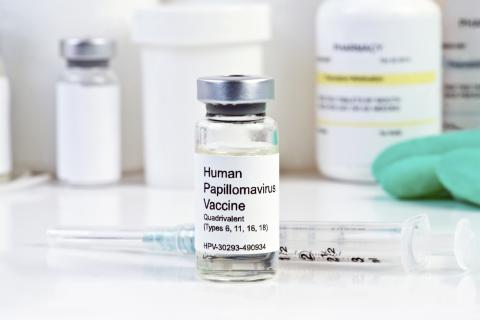U-M among nation’s cancer centers to jointly endorse updated HPV vaccine recommendations
Media contact: Nicole Fawcett, 734-764-2220 | Patients may contact Cancer AnswerLine, 800-865-1125
Statement supports fewer vaccinations, urges action to increase national vaccination rates
ANN ARBOR, Michigan ― Recognizing a critical need to improve national vaccination rates for the human papillomavirus, the University of Michigan Rogel Cancer Center has again united with each of the 69 National Cancer Institute-designated cancer centers in issuing a joint statement in support of recently revised recommendations from the Centers for Disease Control and Prevention.

“The HPV vaccine is an important cancer prevention strategy. By following the new CDC guidelines, we can reduce the burden of cancer and improve quality of life for people at risk,” says Eric Fearon, M.D., Ph.D., director of the U-M Rogel Cancer Center.
According to the CDC, incidence rates of HPV-associated cancers have continued to rise, with approximately 39,000 new HPV-associated cancers now diagnosed each year in the United States. Although HPV vaccines can prevent the majority of cervical, anal, oropharyngeal (middle throat) and other genital cancers, vaccination rates remain low across the U.S., with just 41.9 percent of girls and 28.1 percent of boys completing the recommend vaccine series.
The new guidelines from the CDC recommend that children aged 11 to 12 should receive two doses of the HPV vaccine at least six months apart. Adolescents and young adults older than 15 should continue to complete the three-dose series.
Research shows there are a number of barriers to overcome to improve vaccination rates, including a lack of strong recommendations from physicians and parents not understanding that this vaccine protects against several types of cancer.
In an effort to overcome these barriers, NCI-designated cancer centers have organized a continuing series of national summits to share new research, discuss best practices and identify collective action toward improving vaccination rates.
“We have been inspired by the White House Cancer Moonshot to work together in eliminating cancer,” says Electra Paskett, Ph.D., associate director for population sciences at The Ohio State University Comprehensive Cancer Center – Arthur G. James Cancer Hospital and Richard J. Solove Research Institute Cancer Control Research Program. “Improving HPV vaccination is an example of an evidence-based prevention strategy we can implement today to save thousands of lives in the future.”
For information about HPV screening, contact the Michigan Medicine Cancer AnswerLine at 800-865-1125.
